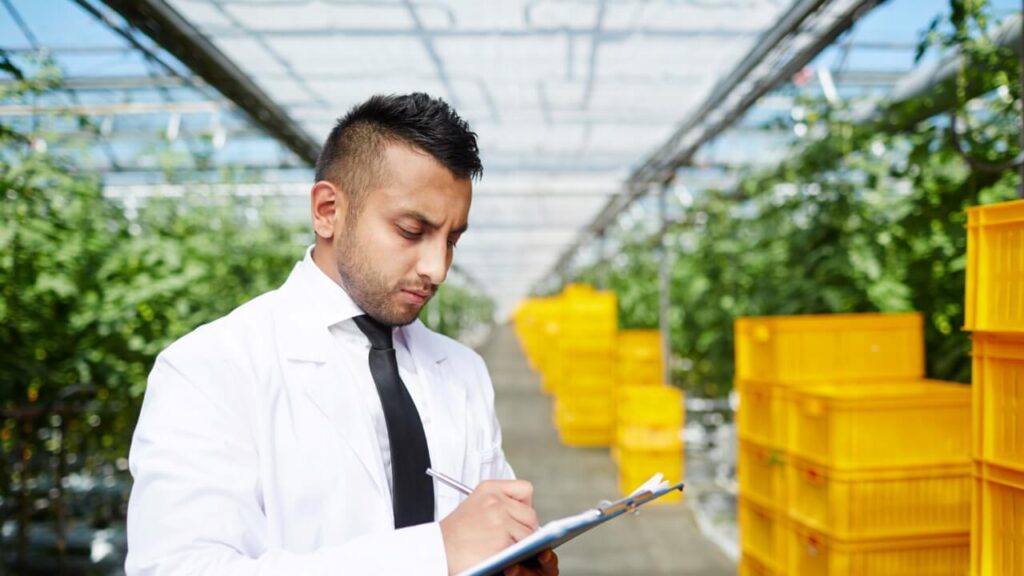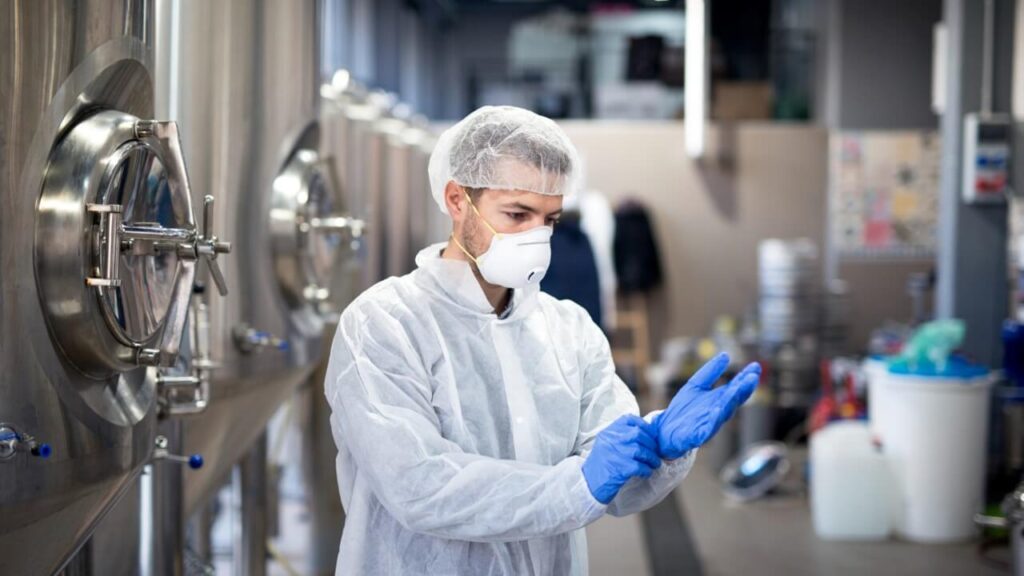ISO 22000 - Food Safety Management Systems, HACCP, GMP
Home » Consultation Services » ISO 22000:2018 Food Safety Management Systems, HACCP, GMP
Understanding ISO 22000 - Food Safety Management Systems (FSMS)
ISO 22000 is an international standard for food safety management systems, providing businesses with a comprehensive framework to ensure food safety throughout the entire supply chain. Titled “Food Safety Management Systems – Requirements for Any Organization in the Food Chain,” ISO 22000 integrates seamlessly with ISO 9001:2015 and HACCP principles, making it ideal for companies looking to streamline food safety protocols while maintaining quality assurance.
As food safety hazards can enter the food chain at any stage, ISO 22000 certification is essential for a wide range of industries. This includes manufacturers of food packaging materials, processing equipment, cleaning products, food additives, and ingredients. By achieving ISO 22000 certification, these organizations demonstrate their commitment to delivering safe and high-quality products while enhancing their market reputation.
At SQC, we provide expert guidance to help businesses navigate the ISO 22000 certification process. From gap analysis to system implementation, our tailored consulting services ensure the smooth adoption of Food Safety Management Systems.
Ensuring Food Safety Across Global Supply Chains
Like any other industry, food manufacturers must adhere to strict food safety standards to protect consumers from health risks. However, food supply chains often span multiple countries and involve a variety of organizations and subcontractors, from feed producers and food canners to transport companies and retailers. A single weak link, such as a contaminated ingredient or poorly managed farm, can result in unsafe food, putting public health, finances, and brand reputation at risk. ISO 22000 certification helps prevent these issues by ensuring effective food safety management across the supply chain.
The History of ISO 22000
ISO 22000 was published in September 2005, to provide a framework of requirements, and confirm a global approach for an international industry. The standard was developed within ISO by experts from the food industry, along with representatives of specialized international organizations. Additional cooperation came from the Codex Alimentarius Commission, which was established by the United Nations’ Food and Agriculture Organization (FAO) and World Health Organization (WHO) to develop food standards.
The Codex HACCP (Hazard Analysis and Critical Control Point) is widely accepted as an essential tool for managing food safety especially when combined with an auditable management system. In fact, ISO 22000 will make it easier for organizations worldwide to implement the Codex HACCP system for food hygiene in way that will be consistent regardless of the specific food product or the country involved.
Previously, more than 20 different national standards had arisen, creating uneven levels of food safety, adding costs and complications. The new standard was needed to curtail the costs and hardship involved in food-borne illnesses, particularly in developing countries. ISO 22000 is backed by international consensus, generating requirements for good practice on a worldwide basis.

Requirements of ISO 22000
ISO 22000:2018 has ten sections. Three sections are general information for your company about the standard and are not auditable. Certification focuses on the other seven key auditable sections:
- Context of the Organization
- Leadership
- Planning
- Support
- Operation
- Performance Evaluation
- Improvement
The evolution of the standard brought increased requirements for companies to demonstrate continual improvement, reduced risk, and provided overall focus on customer satisfaction using a process approach.
Benefits of Implementing ISO 22000
Implementing ISO 22000:2018 ensures safe and high-quality food products throughout the supply chain.
Improved Customer Satisfaction
Ensure consistent delivery of safe, high-quality food, boosting customer satisfaction and brand loyalty.
Enhanced Health and Safety
Reduce risks of contamination and ensure the health and safety of consumers by following strict food safety practices.
Regulatory Compliance
Help businesses meet local and international food safety regulations, reducing compliance risks.
Alignment with Other Standards
The system integrates with HACCP, ISO 9001, and other standards, simplifying compliance with multiple guidelines.
Greater Transparency
Improves supply chain transparency, ensuring better monitoring and traceability of food safety practices.
Better Risk Management
Enhance risk response, allowing businesses to identify and address food safety hazards efficiently.
Reduced Investigation Time
Reduce investigation time by streamlining the identification and resolution of food safety issues.


Aligned with ISO 9001
ISO 22000 can be implemented independently, but it is fully compatible with ISO 9001, making it easy for organizations already certified to ISO 9001 to extend their certification to include ISO 22000. ISO 22000 includes a table showing the correspondence of its requirements with those of ISO 9001, helping users and businesses to align the two standards effectively. Food service businesses can combine both ISO standards or enhance their existing ISO 9001 system to meet food safety requirements. Following the same structure as ISO 9001, ISO 22000 is a globally recognized standard that supports certification across the entire food supply chain.
Learn More About ISO 22000:2018
Additional information on ISO 22000 can be found in the ISO Catalogue in the ISO Store at www.iso.org. The standard includes additional documents, such as:
- ISO/TS 22004, Food safety management systems – Guidance on the application of ISO 22000:2005. This provides important guidance that can assist small and medium-sized food enterprises around the world.
- ISO/TS 22003, Food safety management systems – Requirements for bodies providing audit and certification of food safety management systems. This will provide rules for auditing a food safety management system and guide registrars who intend to perform ISO 22000 audits. It was published in the first quarter of 2006.
- ISO 22005, Traceability in the feed and food chain – General principles and guidance for system design and development. This was circulated as a Draft International Standard.
- In partnership with the International Trade Centre (ITC) – the technical cooperation agency of the United Nations Conference on Trade and Development (UNCTAD) and the World Trade Organization (WTO) – ISO is also preparing an easy-to-use check-list for small businesses and developing countries, titled ISO 22000: Are you ready?
Hazard Analysis and Critical Control Point (HACCP)
Hazard Analysis and Critical Control Point (HACCP) is a globally recognized system designed to identify, assess, and control potential hazards in food production. These hazards can be microbiological, chemical, or physical, and HACCP ensures proactive management to safeguard the food supply chain.
HACCP compliance is mandatory for food businesses, ensuring safety through flexible methods like formal systems or hygiene practices.

Key Steps in HACCP
- Identify Potential Hazards: Determine what could go wrong in the food production process, from raw materials to final products.
- Prevent Risks: Develop controls to mitigate risks and ensure safe food handling practices.
- Monitor and Verify: Continuously ensure compliance with safety measures and maintain robust documentation.

Achieve HACCP Compliance with a Tailored Approach
Since 1998, it has been a legal requirement for all food businesses to implement a Food Safety Management System based on the principles of HACCP. This ensures the identification, evaluation, and control of food safety hazards throughout the supply chain, helping businesses maintain compliance with food safety regulations.
Food businesses can meet HACCP requirements through various approaches:
- Developing a Comprehensive HACCP Plan
- Following Industry-Recognized Food Safety Guides
- Simplified Compliance for Basic Food Operations
Benefits of Implementing HACCP
Enhanced Food Safety Management
Establish a robust system for identifying and controlling hazards.
Customer Satisfaction
Deliver consistently safe and high-quality products that meet customer requirements including quality, safety and legality.
Cost Efficiency
Reduce risks of product recalls, financial penalties, and operational disruptions by preventing hazards before they occur.
Legal Compliance
Ensures that your organization complies with statutory, regulatory and contractual requirements.
Streamlined Operations
Increase operational efficiency by identifying critical control points, ensuring product traceability, and managing nonconformities effectively.
Market Competitiveness
Meet procurement specifications and win more contracts with HACCP certification.
Good Manufacturing Practices (GMP)
Good Manufacturing Practices (GMP), also known as Prerequisite Programs (PRP), are vital for businesses committed to food safety standards like ISO 22000 and HACCP. GMP serves as the cornerstone for implementing effective Food Safety Management Systems, ensuring the safety and quality of food products from production to consumption.

Key Components of GMP for Food Businesses
GMP outlines the essential operational conditions and procedures for food safety, including:
- Ensuring food premises are constructed and maintained to support safety protocols.
- Providing comprehensive staff training on food safety practices.
- Regular upkeep of utensils and machinery to prevent contamination.
- Managing cleaning agents, pest control substances, and lubricants to ensure safety.
- Proper identification, storage, and disposal of waste materials.
- Effective tracking of ingredients and products throughout the supply chain.
- Maintaining hygiene across equipment, utensils, and premises.
- Implementing robust pest management strategies.
Benefits of GMP Certification
- Cost Savings: Streamline processes to reduce waste and save resources.
- Proven Food Safety: Show your commitment to safe and efficient food handling.
- Legal Compliance: Meet legal food safety requirements and build customer trust.
- Access to Global Markets: Comply with international standards, opening doors for global trade.
- Stronger Food Safety Culture: Build a culture of food safety within your company.
- Fewer Returns and Rejections: Reduce product claims, returns, and rejections by maintaining high safety standards.
Professional ISO 22000 Consultant in Malaysia
At SQC, our comprehensive ISO 22000:2018 consulting services guide your business through each step of certification, ensuring compliance with the ISO 22000:2018 standard and setting your organization up for long-term success. Our process includes:
Initial Consultation and Assessment
We begin with a thorough analysis to understand your organization’s food safety goals, current practices, and desired outcomes with ISO 22000 standards. This helps us identify your unique needs and expectations, ensuring we develop a strategy tailored to your business.
Planning and Customization
Our team assists in developing a customized plan for ISO 22000 implementation. This includes defining the scope across relevant departments, setting realistic timelines, and collaborating with your team to establish a practical schedule for achieving certification.
Analysis and Policy Development
We conduct a comprehensive gap analysis, comparing your current food safety processes with ISO 22000 requirements. Our consultants will help create a customized documentation framework, revise policies, and align procedures to bridge any gaps, ensuring compliance with food safety standards.
Training and Implementation
In close collaboration with your team, we support the implementation of new processes identified during the gap analysis. We provide targeted training on ISO 22000 standards, ensuring employees understand their role in maintaining food safety and compliance. We also help establish an internal audit program to monitor and improve processes.
Pre-Certification and Audit Support
Prior to the certification audit, we conduct a pre-certification audit to evaluate your readiness for ISO 22000 certification. Our team assists with implementing corrective actions, if needed, and guides you through selecting a reputable certification body. We support you throughout the final certification audit process to ensure success.
Continuous Support and Improvement
After achieving ISO 22000 certification, we help foster a culture of continuous improvement within your organization. We conduct periodic reviews to ensure ongoing compliance and help your food safety management system adapt to evolving industry standards and regulations. Our continuous support ensures your system remains effective and aligned with food safety best practices.
FAQs on ISO 22000 Food Safety Management
What is ISO 22000?
ISO 22000 is an internationally recognized standard for Food Safety Management Systems (FSMS). It outlines the requirements for organizations to ensure food safety along the entire food supply chain, from production to delivery. ISO 22000 helps businesses identify, control, and prevent food safety hazards to provide safe food.
Why is ISO 22000 important for my business?
ISO 22000 certification demonstrates a strong commitment to food safety, customer satisfaction, and regulatory compliance. It helps reduce food safety risks, improve operational efficiency, and enhance your reputation in the market.
What are the requirements for ISO 22000 certification?
ISO 22000 certification requires alignment with key sections of the standard, including Context of the Organization, Leadership, Planning, Support, Operation, Performance Evaluation, and Improvement. These ensure a systematic approach to quality management. Get in touch with our consultants to find out more.
How long does it take to achieve ISO 22000 certification?
The time required to achieve ISO 22000 certification depends on factors such as the size of the organization, current food safety practices, and readiness. Typically, the process can take several months to a year, depending on the complexity of the business
What is the cost of ISO 22000 certification in Malaysia?
The cost of ISO 22000 certification in Malaysia varies based on factors like company size, scope, and certification body fees. Consulting fees may also vary depending on the level of support needed, generally ranging around several thousand Ringgit Malaysia. Contact us to find out more.
Do I need a consultant for ISO 22000?
While ISO 22000 certification can be achieved independently, working with a consultant can simplify the process, provide expert insights, and increase the likelihood of successful certification.
Can I apply for ISO 22000 without a consultant?
Yes, but working with a consultant can simplify the process, provide essential guidance, and reduce the time to certification. If you prefer to apply for ISO 22000:2018 by your own organization, consider visiting our Training Programmes for resources and courses that can help you understand and implement ISO 22000 requirements effectively.
Can ISO 22000 be integrated with other ISO standards?
Yes, ISO 22000 can be integrated with other ISO standards, such as ISO 9001 for quality management and ISO 14001 for environmental management. Integrating ISO 22000 with ISO 9001 and ISO 14001 allows businesses to create an Integrated Management System (IMS) and to harmonize processes, reduce duplication of efforts, and optimize resource allocation.
Is ISO 22000 suitable for all types of food businesses?
Yes, ISO 22000 is applicable to any organization involved in the food chain, from producers to processors, manufacturers, distributors, and retailers. It is suitable for businesses of all sizes, helping them manage food safety risks and ensure compliance with food safety standards.
Hundreds of Thousands Have Chosen ISO 22000
Organizations implementing ISO 22000 experience improved food safety management, reduced risks, enhanced customer trust, and better regulatory compliance. Adopting ISO 22000 not only improves food safety but also enhances overall business performance and sustainability.
Ready to get yours? Contact us today to find out more!
